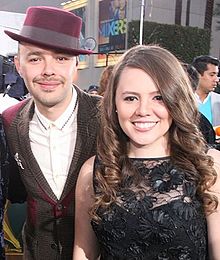Mexican pop music
This article has multiple issues. Please help improve it or discuss these issues on the talk page. (Learn how and when to remove these template messages)
|
| Mexican pop | |
|---|---|
| Stylistic origins | 1700s – 1790s: |
Mexican pop is a
Mexico is the country that exports the most entertainment in Spanish language. Mexican pop was limited to Latin America until the mid-1990s, when an interest towards this type of music increased after Selena's, Luis Miguel's, Paulina Rubio's, Thalía's and Angélica María's debuts before the mainstream USA audience.
In the southwestern United States, Spanish guitar rhythms and Mexican musical influences may have inspired some of the music of American musicians
In 1954
1970s and 1980s


On September 13, 1969,
In 1970
The

Female balada singers that became topped the Latin music charts includes Ana Gabriel, Daniela Romo, Rocío Dúrcal, Gloria Estefan, and Marisela. Notably, several baladas were Spanish-language covers of songs originally performed in Italian. Notable Spanish-language covers of Italian songs include "Maldita primavera" by Yuri, "Toda la Vida" by Emmanuel, "Yo No Te Pido la Luna" by Daniela Romo, and "Tan Enamorados" by Ricardo Montaner.[4]
The 1980s gave rise to the teenage groups

Aside from the baladas, several Latin pop artists and bands performed variety of Spanish-language pop and dance music targeted to the younger audience. These include
During the 1980s songwriters like Guillermo Méndez Guiú, Rafael Pérez Botija or Aureo Baqueiro wrote songs for singers like
. Although not all of these singers are from Mexico.
The most well-known Mexican singer of the 1970s and 1980s was José José. Known as "El Principe de La Cancion" (The Prince of the Song), he is recognizable for his romantic ballads and gifted vocals. José José has sold over 100 million albums in his career and became a huge influence to very popular singers like: Cristian Castro, Vicente Fernández, Alejandro Fernández, Pepe Aguilar, Manuel Mijares, Lupita D'Alessio, Reyli, and Nelson Ned.[10]
When Thalía became part of Timbiriche in the 1980s, tension with Paulina a group member became instantaneous and the rivalry to monopolize the lead role was warming the atmosphere and culminated at a point in which they ended up graving each other's hairs on stage. Thalia and Paulina have frequently garnered comparisons ever since, even after the two directed their solo career.[11] In which the media sets them up, competing for the title of Latin pop queen. Similar to the comparison between Christina Aguilera and Britney Spears in the American market who also both started as group membership at The Mickey Mouse Club.[12][13]

In the 1980s, the regional music scene in both Mexico and the Mexican American community in the United States was dominated by
In 1985 Sheena Easton and Luis Miguel wins the Grammy Award for Best Mexican/Mexican-American Performance for "Me Gustas Tal Como Eres". Eugenia León, representing Mexico, wins the 14th Annual OTI Festival with her song "El Fandango Aquí"[19] in 1986 Vikki Carr wins the Grammy Award for Best Mexican/Mexican-American Performance for Simplemente Mujer.
1990s
Latin boys band and vocal pop groups were storming up the charts in Mexico and Central America. Mexican boy band

Beginning in the 1990s, iconic pop act of the 1980s Timbiriche began to lose popularity mainly to the constant change of bandmembers, while Magneto stood stable in the music scene. Before the teen
in 1998. Minor one-hit wonder acts were successful during this era which were also focused on a teen pop formula.The 1991

In 1992 Vikki Carr an American from El Paso, Texas, born to parents of Mexican ancestry won the Grammy Award for Best Latin Pop Album for Cosas del Amor an album with the lead single being a duet with Ana Gabriel of the same name. The track earned awards such as a Lo Nuestro Awards for Best Pop Song and the Single of the Year mention by the Radio y Música journal.
In 1993 Linda Ronstadt won the Grammy Award for Best Tropical Latin Album for her album Frenesí and the Grammy Award for Best Mexican-American Album for her album Mas Canciones.

By the early to mid 1990s, the torch for Mexican music was carried by another
Selena only recorded 4 songs for her
In 1995 Luis Miguel won the Grammy Award for Best Latin Pop Performance for his album Segundo Romance and Vikki Carr wins the Grammy Award for Best Mexican-American Performance for her album Recuerdo a Javier Solís.
In 1996 the third annual Billboard Latin Music Awards are also held on May. Selena becomes the most awarded artist of the award ceremony, receiving four award posthumously including Hot Latin Tracks Artist of the Year. Mexican singer Juan Gabriel is inducted into the Billboard Latin Music Hall of Fame.[28]
In the late 1990s, Ricky Martin's success in Europe with the hit
The most successful Mexican singer of the 1990s was Luis Miguel. Best known for his technically skilled and smooth crooning vocals, Luis Miguel's super-stardom began since the late 1980s. In 1991, his career went to even greater heights and earned him the respect of a wider audience with the release of Romance, an album of romantic boleros. Most of them were from the 1940s and 1950s. Despite singing boleros from years past, Luis Miguel was recognized for reinventing the bolero for modern audiences. The album Romance, which became his most successful album ever, eventually sold 15 million units worldwide. Luis Miguel has successfully performed pop music, bolero, mariachi and romantic ballads. He has won four Latin Grammy Awards, five Grammy Awards, and has sold an estimate of 90 million albums until today. He is known in Latin America and Spain as "El Sol de México" (The Sun of Mexico).


Mexican singer José José is inducted into the Billboard Latin Music Hall of Fame in 1997 and Mexican singer Vicente Fernández is inducted into the Billboard Latin Music of Fame in 1998. Alejandro Fernández is the biggest winner with five awards at the 10th Annual Lo Nuestro Awards.[20]
Thalía often referred to as the "Queen of Latin Pop" Televisa has exported media to many countries. This has allowed Mexican actors to take advantage of their popularity to launch music careers in countries where Televisa telenovelas are popular. Some examples of these actors are Lucía Méndez, Verónica Castro and Guillermo Capetillo. Verónica's son, Cristian Castro, started his career around this time and became popular throughout Latin America.
The most successful singer to combine ranchera, mariachi and pop music was Alejandro Fernández. He originally specialized in traditional, earthy forms of Mexican folk and country music. However, his later work was focused on mainstream pop music.
Singers such as Pepe Aguilar, Paulina Rubio, Gloria Trevi, and Aracely Arámbula have also produced songs that combine traditional Mexican music with popular music. The Mexican pop singers who were very successful in Mexico and the rest of North America, Latin America, Europe and Asia are Thalía, Gloria Trevi and Paulina Rubio.
The idea of creating a pop band after a telenovela was first explored in 1991 with the cast of Muñecos de Papel (With Ricky Martin, Angélica Rivera, and former Timbiriche members Sasha Sokol and Erik Rubin). In 1999, the same formula was explored with the telenovela DKDA with Alessandra Rossaldo (then member of Sentidos Opuestos), Patricio Borghetti and Ernesto D'Alessio. This formula would be explored again in 2004 with the creation of the most successful group in Latinamerica RBD.
2000s and 2010s

In 2000, Gloria Trevi, Andrade, and backup singer Maria Raquenel Portillo were arrested in Rio de Janeiro, Brazil, on charges of corrupting minors.[29][30] Trevi was cleared of the charges in 2004, due to lack of evidence, after spending four years and eight months in prison.[31]
The century saw new groups
Also Pop Music faces competition from other genres such as
In 2000 Amarte Es un Placer by Luis Miguel won the Latin Grammy Award for Album of the Year.
This century also saw the
In 2010 Mexican pop group Camila won the Latin Grammy Award for Record of the Year for "Mientes" while Mario Domm and Monica Velez won the Latin Grammy Award for Song of the Year for the song.

"

Viva Duets is the studio album by Tony Bennett, released in October 2012. Thalia's first English-language album Thalia, shares a title with Thalía's 1990 and 2002 Spanish-language albums. "I Want You" was the album's most popular song, peaking at number 22 on the Billboard Hot 100 and number 7 in the Mainstream chart. It is her only song to date that has charted within the Billboard Hot 100. In Greece, the song peaked number twenty-six in Top 50 singles sales. The Spanish version of the song, "I Want You" was released for the Spanish-languaged audience and also perform quite well on the Latin Charts, peaking within the top ten of the Hot Latin Tracks at number nine.
Foreign pop artists have had success in Mexico. In May 2013, Christina Aguilera appeared on Mexican singer Alejandro Fernández's cover of "Hoy Tengo Ganas de Ti" from his album Confidencias.[33]

On September 24, 2015, Mexican singer-songwriter
2020s

During the quarantine due to the
On April 26, 2020,
Lupita Infante granddaughter of Pedro Infante, and Mariachi Sol de México de José Hernández gave tribute to Pedro Infante singing "Amorcito Corazón" at the 21st Annual Latin Grammy Awards.
Silvana Estrada shared the 2022 Latin Grammy Award for Best New Artist with Angela Alvarez at the 23rd Annual Latin Grammy Awards.[40]
See also
- Latin Grammy Hall of Fame
- Top 100 Mexico
- List of best-selling albums in Mexico
- Regional Mexican
- Regional Mexican Airplay
References
- ^ "Televisa Brings 2006 FIFA World Cup to Mexico in HD With Snell & Wilcox Kahuna SD/HD Production Switcher". Press release. Snell & Wilcox. 2006-06-27. Archived from the original on 2006-08-11. Retrieved 2007-09-30.
- ^ Cobo, Leila (November 29, 2003). "The Prince's 40-Year Reign: A Billboard Q&A". Billboard. Vol. 115, no. 48. p. 28.
- ^ ISBN 978-0-313-34396-4. Retrieved October 30, 2014.
- ^ Ardilla, Uriel (24 May 2016). "8 canciones que no sabías que son italianas". Vibra (in Spanish). Retrieved 7 August 2019.
- ^ "Alejandra Ávalos es madrina delujo en plaza de las estrellas". enelbrasero.com. November 4, 2014. Retrieved September 11, 2017.
- ^ "Clásicos de los años ochenta". People en Español (in Spanish). 13 November 2009. Retrieved 6 August 2019.
- ^ Mendizabal, Amaya (4 October 2016). "Enrique Iglesias' 'Bailando' & More of the Longest-Leading No. 1s in 30 Years of the Hot Latin Songs Chart". Billboard. Prometheus Global Media. Retrieved 6 August 2019.
- ISSN 0006-2510. Retrieved April 9, 2015.
- ^ Canelo, Pedro (14 May 2009). "El último llanto de Roxanita Varga". El Comercio (in Spanish). Retrieved 6 August 2019.
- ^ "José José "Esta es mi Vida" LANZAMIENTO". Famaweb.com. Archived from the original on 2014-03-19. Retrieved 2014-06-05.
- ^ Monasterios, María Paz (18 September 2018). "José José "Esta es mi Vida" LANZAMIENTO". El País. elpais.com. Retrieved 2019-09-20.
- ^ Horton, Matthew (August 11, 2012). "Christina Aguilera v Britney Spears: Who's the best popstar?". Retrieved July 19, 2014.
- ^ Maerz, Melissa (August 16, 2013). "Britney Spears vs. Christina Aguilera: Who's the greater turn-of-the-millennium pop diva?". Entertainment Weekly. Retrieved July 19, 2014.
- ^ "Yuri - Biografía, historia y legado musical | BuenaMusica.com". Buenamusica.com.
- ^ Pineda, Ricardo (12 February 2014). "Melodía para dos: baladas, gruperos, corazones rotos y cubas 'pintaditas'". Vice (in Spanish). Retrieved 8 August 2019.
- ISBN 9781476627236. Retrieved 8 August 2019.
- ^ Moyer, Justin Wm. (14 July 2015). "Balladeer Joan Sebastian is dead at 64". Washington Post. Retrieved 8 August 2019.
- ISBN 9780313314995. Retrieved 8 August 2019.
- ^ García, Sebastian (September 23, 1985). "La representante de México, Eugenia León, ganadora del XVI Festival de la OTI" [Mexico's Representative, Eugenia León, Winner of the 16th OTI Festival]. El País (in Spanish). Seville. Retrieved May 31, 2018.
- ^ Univision Communications. Archived from the originalon June 26, 2015. Retrieved March 8, 2014.
- ^ Holston, Mark (1 September 1995). "Ageless Romance with Bolero". Américas. Organization of American States. Retrieved 21 March 2015.
- ^ Lannert, John (June 18, 1994). "Selena Grabs Top Spot on Latin 50". Billboard. Vol. 106, no. 25. p. 34. Retrieved August 19, 2016.
- ^ Schone, Mark (April 20, 1995). "A Postmortem Star In death, Selena is a crossover success". Newsday. Retrieved November 4, 2011.
- ^ Richmond 1995, p. 48.
- ^ Novas 1995, p. 63.
- ^ Ramirez, Rauly (April 2, 2011). "Joan Sebastian's Eighth No. 1". Billboard. Vol. 123, no. 11. p. 66. Retrieved August 19, 2016.
- ^ Burr, Ramiro (March 3, 2005). "Still In Love With Selena". Billboard. Prometheus Global Media. Retrieved July 28, 2009.
- ISSN 0006-2510. Retrieved March 23, 2014.
- ^ Preston, Julia (14 January 2000). "Mexican Star in Sex Case Is Arrested in Rio (Published 2000)". The New York Times. Archived from the original on 2023-06-01.
- ^ Prosecutor wants charges against Trevi
- ^ Mexico's Madonna free at last in climax to real-life soap
- ^ "Buzz Briefs: Luis Miguel, Bon Jovi". CBS News. July 8, 2008.
- ^ "Hoy Tengo Ganas De Ti [feat. Christina Aguilera]: Alejandro Fernández". Amazon.es (Spain). May 14, 2013. Retrieved October 11, 2013.
- ^ Mendizabal, Amaya. "Farruko's 'Sunset' Shines in Top Five on Hot Latin Songs Chart". Billboard.com. Retrieved September 29, 2015.
- ^ (ABC News)
- ^ "Artistas unen su voz para 'Resistiré México'". ABC Noticias (in Spanish). Retrieved April 16, 2020.
- ^ "Ha*Ash, Belinda y Paty Cantú, entre otros, unen sus voces en 'Resistiré México'". Quién (in Spanish). April 16, 2020. Retrieved April 16, 2020.
- ^ TIM, Televisa. "'Se Agradece': el evento para celebrar a los que luchan con valor contra el COVID-19". Telehit (in Spanish). Retrieved 2020-07-29.
- ^ "All the Highlights from Canada's 'Stronger Together' Show". 27 April 2020.
- ^ Huston-Crespo, Marysabel (2022-11-17). "Angela Álvarez makes history at age 95 with Latin Grammy tie win for best new artist". CNN.
Works cited
- Novas, Himilce (1995). Remembering Selena (1st ed.). Sagebrush Education Resources. ISBN 0613926374.
- Richmond, Clint (1995). Selena! : The Phenomenal Life and Tragic Death of the Tejano Music Queen (1st ed.). New York, N.Y.: Pocket Books. ISBN 0671545221.


